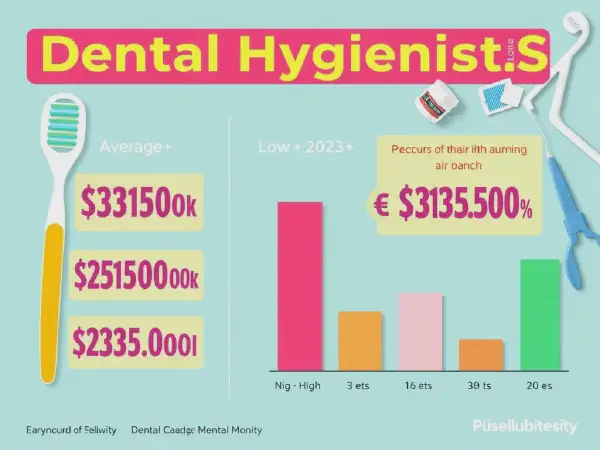Discover How Much Dental Hygienists Make in 2023

Understanding Dental Hygienist Salaries: A Comprehensive Overview
Dental hygienist salaries have become a topic of interest for many aspiring professionals in the dental field. As healthcare demands grow, so does the need for qualified dental hygienists, which impacts their earning potential. This article explores the factors influencing dental hygienist salaries, provides insights into state-wise salary trends, and discusses benefits and compensation beyond just salary.
The average dental hygienist earns a competitive salary, but there are several factors that can affect this figure. Salaries can vary significantly based on experience, geographic location, work settings, certifications, and the demand for dental hygiene services in the area. Understanding these variables is crucial for those pursuing a career in dental hygiene or looking to negotiate their salaries.
On average, dental hygienists in the United States earn a respectable income, with the Bureau of Labor Statistics indicating an annual median wage that is higher than many other healthcare professions. Additionally, dental hygienists often benefit from job security due to the continuous need for dental care and preventive services, making it an attractive career choice.
In examining dental hygienist salaries, it's also important to consider the potential for earning more through specialized roles and advanced certifications. For hygienists who continue their education and strive for advanced positions, there are opportunities to enhance their earnings significantly. As the healthcare landscape evolves, the role of dental hygienists is becoming more prominent, further influencing salary trends.
In summary, dental hygienist salaries depend on a variety of factors, and understanding these can help professionals make informed career decisions. With ongoing demand for dental hygiene services, it's a field with strong potential for financial stability and growth.
Factors Affecting Salary of Dental Hygienists
Experience and education level play a significant role in determining dental hygienist salaries. Typically, those with more years of experience and advanced degrees can command higher wages. In some states, experienced hygienists may earn substantially more than their entry-level counterparts, highlighting the importance of ongoing education and professional development in the field.
Considering the demand for dental healthcare, many aspiring professionals wonder, How Much Do Dental Hygienist Make annually?
Geographic location and cost of living greatly affect salaries as well. Dental hygienists in urban areas with higher living costs often earn more to match the local economic demands. For example, salaries in cities like San Francisco or New York typically exceed those in more rural areas, reflecting differences in demand for dental services and the financial capacity of patients.
Work settings also influence dental hygienist salaries. Those working in private dental offices may earn different wages compared to those employed in public health settings or clinics. Private practices may offer higher salaries, while public health facilities might provide more stable employment but potentially lower wages.
Certification and specialization are crucial factors that can enhance earning potential. Hygienists who obtain additional certifications or specialize in areas such as periodontics, pediatric dentistry, or public health can expect higher salaries due to the advanced skills and knowledge they bring to the practice.
Furthermore, the demand for dental hygiene services plays a vital role in determining salaries. Regions experiencing a shortage of dental hygienists or a growing population are likely to offer higher wages to attract qualified professionals, making it an important factor in salary negotiation.
State-wise Salary Trends for Dental Hygienists
Certain states are known for offering top-paying salaries for dental hygienists. For instance, states like California, Washington, and Alaska consistently rank among the highest for average wages in this profession. These states not only have a high cost of living but also a strong demand for dental services, driving salaries upwards.
Additionally, comparing salaries by region reveals significant disparities. The Northeast and West Coast tend to offer higher salaries than the Midwest or Southern regions of the United States. This regional difference is partly due to variations in living costs and the prevalence of dental practices in those areas.
Cost of living adjustments are essential to consider when analyzing salary figures. A higher salary in a metropolitan area may not translate to greater purchasing power compared to a lower salary in a rural area. Therefore, understanding the cost of living in relation to salary is vital for dental hygienists when making career decisions.
State-specific job growth rates also impact salary trends. States with higher growth rates for dental hygienist positions often indicate a promising future for job seekers, potentially leading to better salaries. Monitoring these trends can help aspiring hygienists identify lucrative locations for employment.
Local economies have a direct impact on salary as well. Regions with thriving economies tend to have more dental practices, leading to increased demand for hygienists — this, in turn, can push salaries higher. Analyzing local economic conditions may provide insight into salary expectations.
Comparison of Dental Hygienist Salaries Across the U.S.
Examining average salary by industry segment reveals that dental hygienists working in specialized practices, such as orthodontics or oral surgery, tend to earn more than those in general dental practices. The differences in the services provided influence the compensation levels.
Urban vs. rural salary differences significantly affect dental hygienist earnings. Urban areas often provide higher salaries to account for higher living costs, while rural areas may have lower salaries but also lower living expenses, making the overall compensation more competitive in those locations.
The distinction between entry-level and experienced hygienists is profound in terms of salary. Entry-level hygienists often earn the least, while those with years of experience can command salaries that are significantly higher due to their advanced skills and reputation.
Full-time vs. part-time work also impacts dental hygienist salaries. Full-time employees typically earn higher salaries and may receive additional benefits. In contrast, part-time workers might have more flexibility but could experience reduced earnings overall due to fewer hours worked.
Lastly, comparing national vs. local averages illustrates that while national averages provide a useful benchmark, individual circumstances can vary widely. Hygienists should use local data to better understand their earning potential based on their specific situation.
Benefits and Compensation Beyond Salary for Dental Hygienists
Beyond salary, many dental hygienists enjoy a range of benefits and compensation methods including health insurance and retirement plans. Many employers offer comprehensive benefits that can add significant value to a hygienist's overall compensation package and enhance job satisfaction.
Paid time off and holidays are also important benefits for dental hygienists. Having access to paid leave allows for better work-life balance, which is crucial in stressful healthcare environments. Many employers offer generous holiday policies to support their staff.
Continuing education support is a valuable benefit aimed at helping hygienists advance their careers. Many dental offices provide financial assistance for further education, which can be a significant incentive for professionals looking to specialize or enhance their skills.
Bonuses and performance incentives can increase overall earnings for dental hygienists. Performance-based pay can motivate hygienists to improve their skills and enhance their contribution to the practice.
Lastly, work-life balance considerations are an essential factor in job satisfaction for dental hygienists. Many practices offer flexible working hours and shifts that allow professionals to balance their work with personal commitments, which can be a major draw for potential employees.
Career Advancement Opportunities in Dental Hygiene
Career advancement opportunities exist within the dental hygiene field and can lead to higher salaries. By acquiring additional certifications and taking on more responsibilities, hygienists can move into roles that offer more considerable pay and influence within a dental practice.
Specializations and certifications provide viable paths for dental hygienists aiming to boost their salaries. Areas like dental hygiene education, research, or specialized clinical practice can open doors to higher-paying positions.
Leadership roles in dental health can also significantly enhance earning potential. Hygienists who take on managerial roles, such as clinic directors or supervisors, can increase their salaries while impacting practice operations positively.
Transferable skills to other healthcare positions enable dental hygienists to branch into various roles if they wish. Skills such as patient communication, preventive care, and education can be applied to other health domains, potentially enhancing their overall career prospects.
Finally, networking opportunities in dental hygiene, such as attending conferences and joining professional organizations, can lead to new career opportunities and provide access to mentorship, aiding in professional growth and salary advancement.
